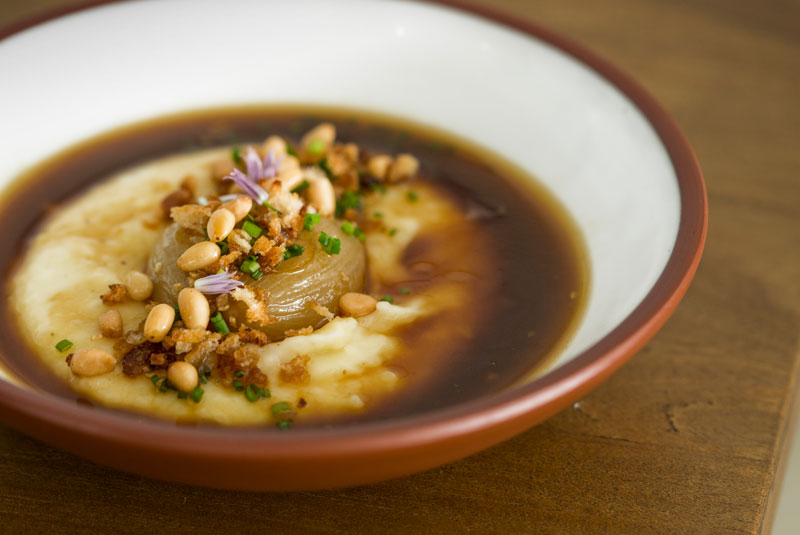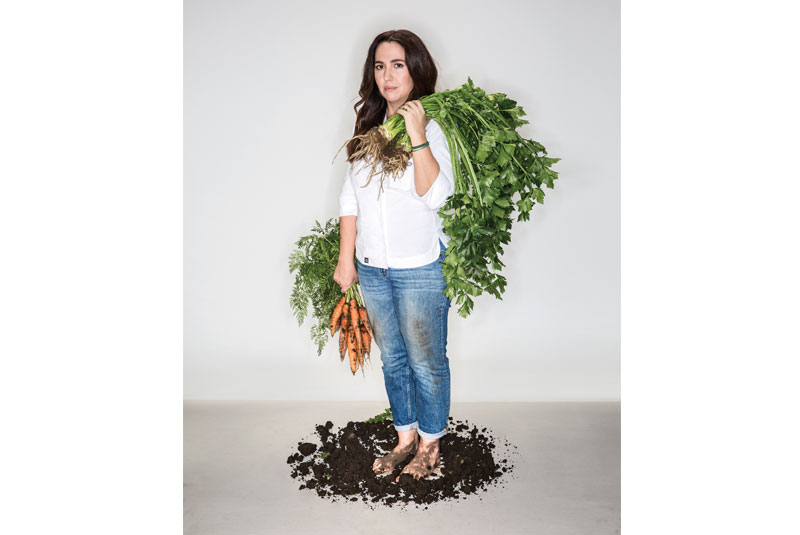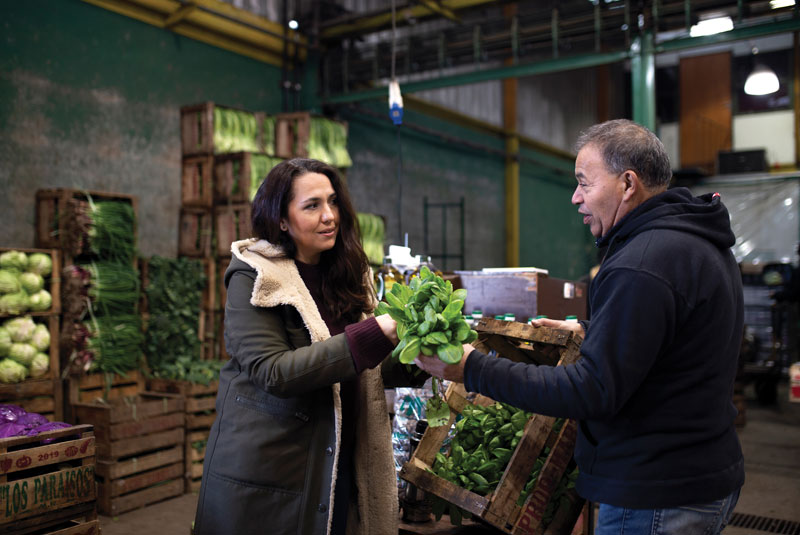Narda Lepes, food activist and chef-owner of Narda Comedor in Buenos Aires, Argentina, is on a mission to show the whole world how to eat better. Discover why the cook named Latin America’s Best Female Chef 2020 wants to abolish the phrase ‘healthy eating’ and read her tips for the next generation of chefs
Narda Lepes has just celebrated a big win. After a lobbying campaign she organised with her peers, the Argentinian senate approved a new national law that requires companies to clearly state on the packaging whether their products contain high quantities of sodium, sugar, fat and calories. But for the chef, a passionate campaigner for better eating habits, this is still only a small step.
“What does it mean to eat well?” she asks pointedly. In Spanish, Lepes’ native language, ‘eating well’ translates as comer rico, or literally, ‘eating richly’. “That richness seems to imply an abundance, but empty calories don’t provide that. We live in a time when technology, communications and information have changed, so we need to redefine what it means to eat well.”
In defence of just ‘food’
The first, essential step for the chef is to stop talking about ‘healthy’ food. “I never, ever use the word ‘healthy’,” she states. “It’s just food, and food needs to make sense, not only with the rest of the meal but also for the body. At the restaurant, if I add a new ingredient into a dish but I feel bloated and heavy after eating it, I immediately take it off the menu.”
The restaurant she is talking about is Narda Comedor in Buenos Aires, the establishment she founded in 2017 that has been voted into the last two editions of Latin America’s 50 Best Restaurants. Following a successful career as a celebrity chef and TV presenter, she is now on a mission to prove that plant-based eating is the way forward, even in a country famous for its steaks and widely known as ‘the land of beef’.
Narda Comedor in Buenos Aires
“We need to keep in mind that it doesn’t make sense to eat big volumes of certain things every day. You can eat lots of chocolate, drink a carton of milk or eat a whole cow, but it has to be occasional,” she says. “Narda Comedor is not for visiting once in a while – you can go several times a week for breakfast, lunch and dinner and you will still feel good. What we do is to encourage people to try things they wouldn’t normally eat or wouldn’t consider delicious.”
Lepes has long believed in eating more vegetables, a habit exemplified on her menu where products such as onion, cauliflower and legumes take centre stage. But what the chef now hopes to change, especially in the context of the current global pandemic, is how people eat at home. “I’m interested in scale, not just in the foodies who come to the restaurant,” she remarks.
With Narda Comedor forced to close for several months in 2020, the chef found alternative ways to advance her mission. First, she launched an app in collaboration with Microsoft. The company approached her with a brief for an app that would use artificial intelligence to improve people’s quality of life, and Lepes helped them create Comé+Plantas (‘eat more plants’).
“There are people out there who may be 50 years old and may be embarrassed to say that they don’t know the difference between leek and fennel,” she says. With the app, these people simply have to take a picture and the AI does the rest: it identifies the vegetable, gives information on its seasonality and provides a series of simple tips for cleaning it, cooking it and conserving it. Comé+Plantas was launched in Argentina in July, and will soon be extended to Chile, Uruguay and Paraguay before becoming available in the whole Latin American region, completely free to download and use.
Slow-cooked onion with 72-hour reduced beef broth and creamy mashed potatoes
Secondly, Lepes wrote and published a new book – her fourth – packed full of tips for those cooking at home. “There are a lot of barriers in the kitchen that we may not always be aware of and that may be preventing us from cooking better,” she says. “For example, using the oven as a cupboard. Or filling the second kitchen drawer with so many tools that we can’t even open it. Or that the best pan we have is also the heaviest one, so we keep it underneath the others and never use it... These are things that we don't verbalise, but they are concrete barriers that prevent us from getting closer to cooking.”
As well as providing practical tips to get people cooking and eating better, the chef is also adamant that modern society’s obsession with recipes is limiting us. “Recipes are for extraordinary things for when we want to reproduce something that is worth it,” she says. “But if you’re always cooking from recipes, then you’re not cooking from products, and if we don't think about our food in terms of products, then we will always end up eating the same things.
“Instead, when you think of food this way, you have to eat in season. The animals we can eat are limited – only four or five – and the carbohydrates we have available are also always the same. On the other hand, vegetables have a seasonal cycle and there is great variety. So first, think that you’re going to eat peas and asparagus. Then, you can add a steak if you want, but only if you’ve put peas and asparagus on your plate first.”
Becoming Latin America’s Best Female Chef
The road to becoming a celebrity chef and a recognisable face on Argentinian TV – with her own show as well as a role as judge on MasterChef – wasn’t always easy for Lepes. She attributes her success to a series of tools that her family instilled in her and that she now hopes to pass on to the next generation.
Lepes in a portrait (image: Revista Brando, Jose Nicolini and Gaspar Kunis)
“I was brought up to tell people to f**k off; to answer back when I need to,” she says. “When I’m faced with an uncomfortable situation, I react. I don’t get paralysed and I know that’s a privilege. Many people, and especially many women, grow up scared. Scared to talk, scared to get into a taxi, scared to walk around the block. The reality is that it’s not the same to work the night shift if you’re a 25-year-old woman or man, because women carry a burden of fear.”
Having personally experienced obstacles as a woman trying to find success in the restaurant industry, she has put in place several measures at Narda Comedor in order to protect her staff. “I tell all the young girls in my kitchen to be really mindful of their backs,” she says. “They may want to prove themselves by lifting a pile of 50 plates, but several of my female friends in the industry had to leave the profession because of back problems. So I make sure to tell my staff that they don’t have to prove anything.”
In Narda Comedor’s kitchen, Lepes also built the corridors 25cm wider than anywhere else in the restaurant. This way, she says, there can be no accidental ‘touching’ between members of staff.
Although at the beginning of her career she struggled to find ways to make her team listen to her, she has found a strategy that works for her at Narda Comedor: “I try to hire people who are much better than me at something,” she says. “My head chef, Martin Sclippa, is the calmest person in the world, while I’m much more passionate. To be able to recognise these qualities in others is very important in order to build a good team.”
Lepes at the farmers' market (image: Revista Brando, Jose Nicolini and Gaspar Kunis)
Lepes highlights that receiving the title of Latin America’s Best Female Chef has a special meaning this year. “With everything that is going on and how everything is changing, I enjoy it and appreciate it,” she says. “I’m grateful to have the opportunity to have a bit more visibility and to be able to express myself at this time, when we’re all wearing our hearts on our sleeves a bit more."
Making the most of today
For the Argentinian chef, trying new ingredients can be the first step to becoming a better person. “In today’s world, we are losing the ability to change our minds, even when we receive new information,” she reflects. “But perhaps through our senses, by trying new things, we can come to analyse our own opinions – such as ‘I don’t like this’ – and listen to someone else’s opinion, too. We have to question ourselves all the time. We don't grow if we don't change; it's difficult, but we have to do it.”
The chef also plans to use the changes brought on by 2020 – the pandemic as well as her nomination as Latin America’s Best Female Chef – to continue to do better for the world. “We don’t know what the future will hold, but I would like to feel that I’m making food a little better in all aspects, from production to restaurants,” she says. “An award like this creates a new challenge. It’s not so much about what you’ve done any more, because it raises the bar for what you’re going to do from now on.”
Lepes’ Latin America’s Best Female Chef Award will be celebrated at a virtual awards ceremony to announce the eighth edition of Latin America’s 50 Best Restaurants, sponsored by S.Pellegrino & Acqua Panna, on Thursday, 3rd December. To stay up to date with the latest news, follow us on Facebook, Instagram, Twitter and YouTube.
‘50/50 is the new 50’ is a content series created by 50 Best and supported by S.Pellegrino with the shared aim of promoting equality, inclusivity and balance in the hospitality sector and beyond.

